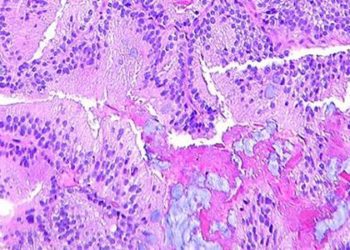Study does not support use of low-dose aspirin after prostate cancer diagnosis
1. This study evaluated the effects of post-diagnosis low-dose aspirin on prostate cancer-specific mortality and found no overall benefit.
2. The study did find a modest benefit in patients taking aspirin for at least 5 years after diagnosis.
Evidence Rating Level: 2 (Good)
Study Rundown: Several recent papers have suggested that regular, low-dose aspirin may improve prostate cancer survival. However, this has usually been an incidental finding in studies focused on cardiovascular disease prevention, which means that they have lacked appropriate controls. This study was unique in its focus on patients who took aspirin following a prostate cancer diagnosis, regardless of cardiovascular status. In general, the authors found no clear reduction in prostate-cancer-specific or all-cause mortality. However, there was a slight benefit for patients who took aspirin regularly for 5-year or 7.5-years post-diagnosis. One major limitation was that this study only included aspirin prescriptions and not over-the-counter usage. However, a 2012 study reported that around 92% of aspirin purchases in Denmark were associated with a prescription, which makes this a reasonable approximation. However, this assumption would make it difficult to validate these data in other populations, perhaps limiting its applicability.
Click to read the study in Annals of Internal Medicine
Click to read an accompanying editorial in Annals of Internal Medicine
Relevant Reading: Do Aspirin and Other NSAIDs Confer a Survival Benefit in Men Diagnosed with Prostate Cancer? A Pooled Analysis of NIH-AARP and PLCO Cohorts
In-Depth [retrospective cohort]: This study considered the correlation between post-diagnosis aspirin use and mortality for all Danish men with a new prostate cancer diagnosis between 2000 and 2011. Men were excluded if they were younger than 35, had a previous history of cancer, emigrated, or had chemotherapy within one year of diagnosis (as a proxy for severe disease). Of note, this study was only possible because of the universal Danish Cancer Registry and National Prescription Registry, and because of the fact that most aspirin in Denmark is dispensed with a prescription. Among the final population of 29136 patients, around a quarter used low-dose aspirin in the year after their diagnosis. Of these, around 87% had also used aspirin before their diagnosis. In the final cohort, 7633 patients died from prostate cancer and 5575 died from other causes. Following reasonable multivariable adjustment, the hazard ratio for prostate cancer-specific mortality was 0.95 (95% CI, 0.89 to 1.01). For all-cause mortality, the hazard ratio was 1.12 (CI 1.05 to 1.20). At the five year timepoint, however, the hazard ratio for prostate cancer-specific mortality was 0.91 (CI 0.83 to 1.01), which fell further by 7.5 years to 0.84 (CI 0.72 to 0.97). These results do not support the hypothesis that aspirin is beneficial for most patients with newly diagnosed prostate cancer, but there may be a slight benefit after many years.
Image: CC/Wiki
©2019 2 Minute Medicine, Inc. All rights reserved. No works may be reproduced without expressed written consent from 2 Minute Medicine, Inc. Inquire about licensing here. No article should be construed as medical advice and is not intended as such by the authors or by 2 Minute Medicine, Inc.




![2 Minute Medicine: Pharma Roundup: Price Hikes, Breakthrough Approvals, Legal Showdowns, Biotech Expansion, and Europe’s Pricing Debate [May 12nd, 2025]](https://www.2minutemedicine.com/wp-content/uploads/2025/05/ChatGPT-Image-May-12-2025-at-10_22_23-AM-350x250.png)




